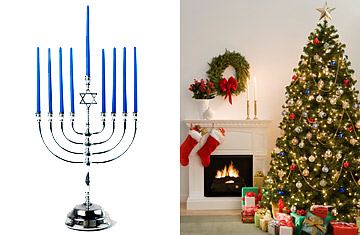
Like many Americans in interfaith households, I'm ping-ponging between traditions this weekend. The painted figures of the Nativity set are finally arranged in the front window; I've caught up on my Advent readings; and the Christmas-cookie-baking marathon is about to start. At the same time, the candles in the menorah are burning brightly; I'm practicing my Hebrew pronunciation for the blessing; and every corner of our apartment smells like latkes.
More than any other time of year, December highlights the variety and mix of religious traditions in the U.S. According to a 2008 study by the Pew Forum on Religion and Public Life, 37% of married adults in the U.S. have a spouse from another religious tradition. Among Jewish Americans, that figure rises to almost half of all marriages. That's a lot of Chrismukkahs, a lot of travel for family holidays and a lot of gifts.
Now a new survey of 4,000 U.S. adults from the Pew Forum shows that even Americans who don't live in interfaith households are curious about other religious traditions. One-quarter of all adults attend services of a faith tradition other than their own at least occasionally throughout the year (not counting special events like weddings and funerals). Social scientists and observers have known for decades that Americans generally have much higher levels of religiosity than their European cousins. But these new findings reveal that this distinctly American enthusiasm for religion includes an embrace of multiple faith practices and beliefs as well.
Protestants are most likely to sample worship services outside their tradition — 3 in 10 say they have attended Catholic, Jewish, Muslim or other services at least occasionally in the past year. African-American Protestants lead this trend, with 42% visiting houses of worship in other traditions, including Catholic churches (19%), Jewish synagogues (8%) and Muslim mosques (5%). One-quarter of white evangelicals share that interest in other traditions. But they are also the most likely to stay close to home: more than half say they attend services only at their own church, not even visiting other churches in the same denomination, although a quarter report trying out services in other traditions.
There seems to be particular interest among Protestants in Catholic services, a development perhaps reflected in Pope Benedict XVI's recent move to welcome dissatisfied Anglicans to worship within the Catholic tradition. Significant numbers of Protestants say they sometimes attend Catholic Mass, including 19% of African-American Protestants and 13% of white evangelicals. The curiosity doesn't run as strong in the other direction, however; only 18% of all Catholics report attending Protestant services.
Even those Americans who are most committed to their religious traditions are willing to dip their toes into other holy water. Weekly church attendance has long been associated with high levels of religious commitment, but more than one-quarter (28%) of those who attend services at least once a week told the Pew researchers that they visit other houses of worship at least occasionally. This crossing of traditions is even more popular among monthly churchgoers — 40% of them report attending other faith services.
The Pew researchers also looked at the effect of interfaith marriage on an individual's willingness to try different religious experiences and concluded that the link "is a complex one." In general, spouses in interfaith marriages tend to be less religiously observant than couples who belong to the same tradition — after all, it can be easier to accept a spouse from another faith if you're not terribly connected to your own. Overall, people in what the researchers call "religiously mixed marriages" attend worship services far less often than their same-religion peers, and they are no more likely to attend services outside their tradition.
However, individuals in interfaith marriages who do have some degree of religious commitment — attending worship services at least yearly — are actually more likely to be interested in a variety of faiths and to attend multiple types of services. More than 4 in 10 interfaith spouses (43%) report visiting other houses of worship, compared with roughly 3 in 10 people married to a spouse from the same faith.
Critics of interfaith marriage charge that it often leads to a watering down — and even abandonment — of both traditions. Rather than feeling strongly tied to two traditions, children feel no attachment to either. Parents who can't agree on which tradition their children should be raised in compromise by attending no services. But the Pew study indicates that for at least some interfaith families, religious commitment can lead to a richer, more varied faith life and a greater willingness to experience traditions outside one's own. That provides some comfort at this time of year to those of us whose homes are ablaze in light from Advent and Hanukkah candles.
